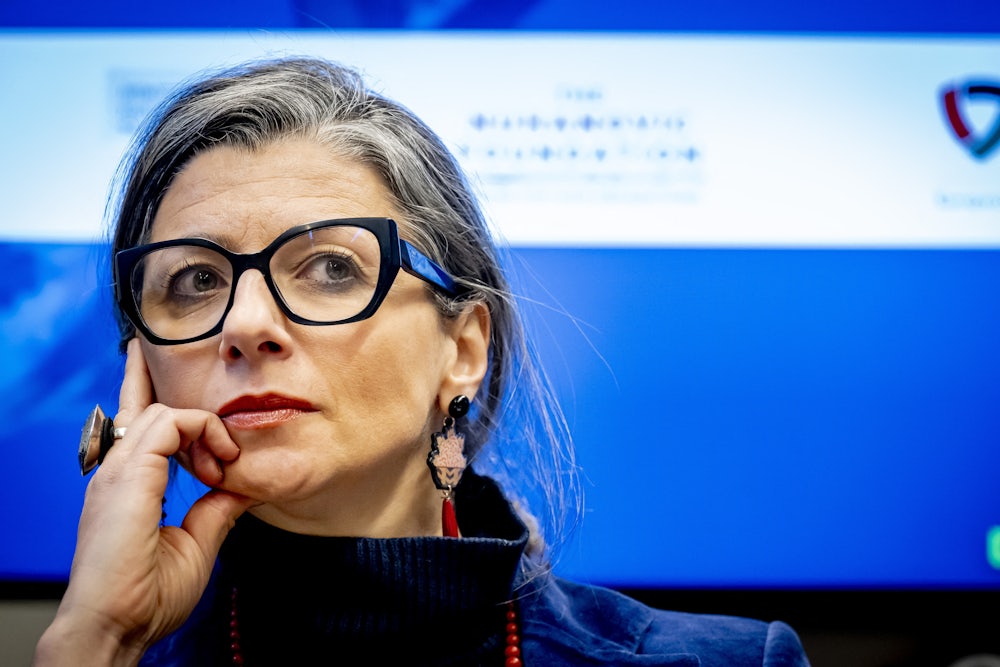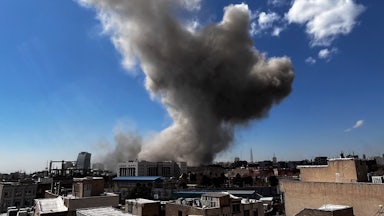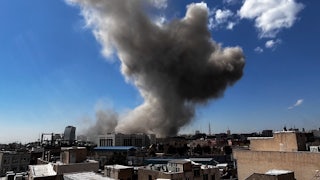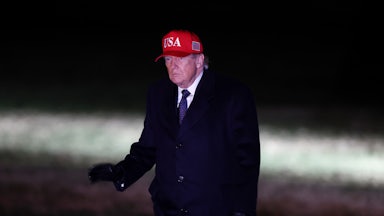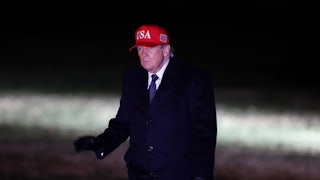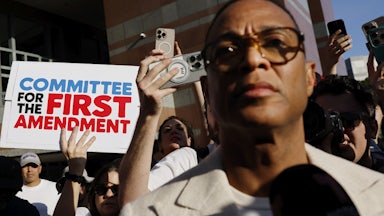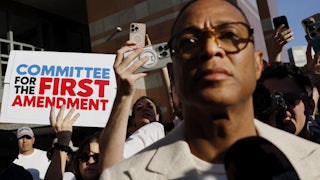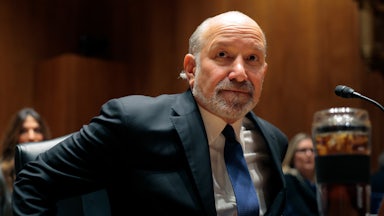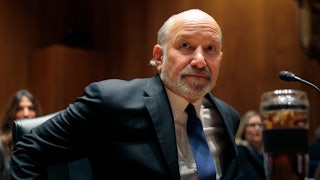The day after the U.S. president announced his plan to turn the Gaza Strip into “the Riviera of the Middle East,” Francesca Albanese was asked about the idea at a Copenhagen press conference. Rolling her eyes behind trademark black-framed spectacles, the U.N. special rapporteur on the occupied Palestinian territories took in a sharp breath, as if to steady her nerves, and leveled a sympathetic gaze at her audience. “Prrresident Trumppp—oh, where to start,” she began, with an exasperated stage growl. Denouncing the plan as “utter nonsense” and “an international crime,” she reminded the press corps that the global community comprises 193 states. “This is the time,” she added, “to give the U.S. what it has been looking for: isolation.”
In other words, Go to your room, Donald.
While Albanese is more than capable of describing the illegitimacy of the Israeli occupation in the dry language of international law, her speciality is this sort of real talk. Her fierce tutelage of one journalist who dared to ask whether she believed Israel “has a right to exist” has garnered millions of views on TikTok. “The state of Israel is there,” she told him. “It’s protected as a member of the United Nations. Does this justify the erasure of another people? Hell no.” Amid nitpicky debates about the real meaning of “from the river to the sea” and endless appeals to the “complexity” of this geopolitical briar patch, Albanese’s ability to offer a relatable, down-to-earth moral vision has made her an unusually powerful advocate for Palestinian liberation and, to Israel’s far-right government, a troublesome irritant.
While Albanese is plainly outraged by the suffering unleashed on Gaza and the complicity of Western nations, her default mode is forbearance—as though she’s conserving her energy for a struggle that will be won not with sound bites but with decades of dogged legal and diplomatic effort. Hope is a verb, she told me during a video chat in January: “Hope is not something that I enjoy from the comfort of my sofa. It’s something that grows in us as we work to make things happen, a force that we nurture and we keep alive all together through what we do.”
Albanese had her first encounter with what she considers the brutality of the occupation in 2010. She was living in Jerusalem, working in the Department of Legal Affairs for the U.N. Relief and Works Agency, when her mother came for a visit. The pair had already toured the usual Holy Land attractions, so Albanese, then in her early thirties, decided on a somewhat more venturesome excursion, to the Ibrahimi Mosque in the Old City of Hebron. They were waiting to enter the mosque when Albanese, who’d paused to chat with another visitor, heard shouts up ahead. An Israeli soldier was demanding that her mother open her bag. Such security measures were standard procedure, Albanese said. But her mother, who didn’t speak English or Hebrew, was confused, clutching her bag as the soldier screamed at her. Albanese hurried to intervene. “He had to inspect her, and I was not challenging that,” she recalled. “I raised my voice at that point. I said, ‘Look, you have to stop shouting. She’s terrified.’ She looked to me so fragile, so frail, and I just wanted to protect her. I felt bad to have taken her there.” The soldier, she recalled, “looked at me with eyes full of blood.”
What most irritated him, she believes, was her defiance. “My mom was scared to death, and probably he wanted me to tremble like a lamb as well, and I didn’t,” Albanese recalled. “I was trembling inside. I was shitting my pants, right?”
The soldier lifted his rifle, aiming it directly at her, when a pair of other soldiers, both female, stepped in, soothing the guard in Hebrew. “Then they told us, ‘Just go, just go.’”
Once inside the mosque, Albanese fell to her knees. “I started crying like a child. It was a horrible day.”
Albanese was hardly unaware of the dehumanizing nature of the occupation. Nor was she new to conflict zones, having served as an election observer in Guinea-Biseau, Haiti, and Pakistan. The “underlying hostility” she felt in Hebron was different, and she never forgot it.
Albanese went on to work for a D.C.-based nongovernmental organization focusing on humanitarian support for Liberia during the Ebola outbreak before co-authoring a well-regarded legal tome, Palestinian Refugees in International Law, published in 2020 by Oxford University Press. It was while promoting the book (virtually, due to the pandemic) that Albanese first caught the eye of Michael Lynk, who then held the rapporteur role and was beginning to consider who might be suited to replace him at the conclusion of his six-year term.
Being special rapporteur for Palestine is one of the most demanding jobs in international relations. The role requires a willingness to steep oneself in the details of one of the world’s most intractable and horrific conflicts while remaining hopeful of a solution. It requires an ability to speak about it cogently, and the equanimity to hold powerful figures to account, sometimes at personal risk. “You’ve got to make sure your facts are correct,” Lynk said. “You’ve got to make sure that you are speaking in a tone that’s going to maximize positive impact and minimize the kind of attacks that are coming at you. You’ve got to learn to talk to the different audiences that you have—the civil society organizations, the diplomats, the political decision-makers, U.N. officials, the media. And you’ve got to be bold.”
Also, you’ve got to do it for free; it’s a volunteer position.
At Lynk’s urging, Albanese applied and won the appointment. In many ways, Lynk said, she is typical of her predecessors: an expert in international and human rights law, with an academic pedigree. But there are differences. Most notably, she is the first woman to hold the post since its creation in 1967. But perhaps more important is her skill as a communicator. “She’s mastered how to speak to the generation under the age of 35 who believes in justice, and who sees what’s been going on with respect to Israel and Palestine as a huge, broader stain with respect to human rights,” Lynk told me. “She’s gained, if you like, a following, because of how adept she is with social media. I think that’s given her a global impact and a presence beyond virtually any special rapporteur. She’s been not only a breath of fresh air on Palestine, but a breath of fresh air for the U.N. human rights system as well.”
As challenging as the role was when Albanese started, on May 1, 2022, it became exponentially more so on October 7, 2023, when Palestinian militants breached the “Iron Wall” security perimeter that encircled Gaza, killing some 1,200 Israelis, most of them noncombatants, and taking some 250 hostages. Israel promptly initiated a ferocious military campaign. Officially the stated goal of the operation was to eradicate Hamas and free the hostages. But the widespread devastation unleashed on Gaza—killing, maiming, displacing, and starving many thousands of Palestinians who had no connection to the attack whatsoever, along with the destruction of the area’s housing, hospitals, universities, and essential infrastructure; the repeated bombing of “safe zones”; and the attacks on U.N. personnel, aid workers, journalists, and doctors, indicated an operation more brutal and far-reaching than a typical military engagement. It was, Albanese became convinced, an unfolding case of genocide.
As she has pointed out in numerous press appearances, speeches, and two sober, meticulously argued reports to the United Nations General Assembly, the term, coined by a Polish attorney and codified into law in 1946, has a precise legal definition, in which the number of people killed or the manner of their destruction has no bearing. Genocide is defined by a handful of material acts, ranging from murder to “deliberately inflicting on the group conditions of life calculated to bring about its physical destruction, in whole or in part,” along with an essential psychological component: the specific intent to do so.
“Here, it’s clearly evident that Israel wants to destroy the Palestinians, wants to erase the Palestinians,” Albanese insisted during our interview. “This has been ongoing for a long time, but now, over the past 15 months, it has escalated.”
Ordinarily, intent is “very hard to establish,” she told me. Few state actors engaged in such a project speak about their goals openly. In the case of Israel’s assault on Gaza, however, they did. Among the many examples detailed in the case brought by South Africa at the International Court of Justice are Israeli Prime Minister Benjamin Netanyahu’s invocation of the biblical story of Amalek (a murderous rival of the ancient Hebrews that was annihilated with God’s blessing), and an assertion by Yoav Gallant, the former defense minister, that water and food would be cut off because “we are fighting human animals and are acting accordingly.” Gallant also spoke brazenly of removing “all the restraints” on the military and promised to “eradicate everything.”
“Normally, you don’t have politicians calling for annihilation, erasure, destruction,” Albanese told me. “You don’t have the dehumanizing language that has been used against the Palestinians. You had it in Rwanda, you had it in Bosnia and Herzegovina, you had it in Myanmar. And here you have it over and over. Not only said; those words have been enacted. And there are thousands and thousands of pieces of evidence—of soldiers, generals, commanders. There is a chain of command that has executed those orders.”
Perhaps inadvertently, one of Israel’s chief defenders, Joe Biden, recently offered further evidence of Netanyahu’s
intentional commission of crimes against humanity. In one of his final interviews as president, he recalled a
conversation with his Israeli counterpart shortly after October 7. While promising U.S. support, he pleaded with Netanyahu to protect
civilians. “I said, ‘But Bibi, you can’t be carpet-bombing these communities.’”
The response seemed to indicate that Israel would take no such precaution. As
Biden reported, “He said to me, ‘Well [the United States] did it. You carpet-bombed Berlin. You dropped a nuclear weapon. You killed thousands of innocent
people because you had to in order to win a war.’” While Netanyahu had a point,
the Geneva
Conventions were codified in the aftermath of World War Two—and have
been ratified by every U.N. member state, including Israel and Palestine—precisely
because
the world agreed that these crimes shocked the conscience and should never
again be perpetrated.
Accusing a nation of genocide, especially a nation founded in part as a safe haven for Jewish victims of the Nazi Holocaust, is not a light undertaking. Given that the Israeli government denies the charge and it has not yet been adjudicated, I asked Albanese whether it was appropriate or useful to invoke the term. She pointed out that the description is regularly applied to other cases despite the lack of legal rulings. “The genocide of the Armenians has never been adjudicated,” she said. “The genocide of the Jews and the Romas and Sintis has never been adjudicated. The genocides of the Native Americans or the Aboriginals have never been adjudicated.”
Perhaps more important, she noted, the Genocide Convention calls on states not only to punish the crime but to prevent it, and the International Court of Justice will likely take years to make its final determination. “I think they will conclude that Israel has committed acts of genocide,” she said, adding that by then it will be too late for the victims.
The case also represents something of a precedent, she added, because it’s the first time a genocide of this particular type—allegedly committed “for the denial of the self-determination of another people”—is being litigated before an international court. “This is what makes the cry for justice in this case even louder, because there are so many Indigenous people that have never had the chance, where the taking of the land is accompanied by the extermination of its inhabitants, to see their case appearing before a court.”
Meanwhile, the war has exposed what many see as U.S. hypocrisy in its selective use of international law to criticize its enemies, such as Russia, while protecting allies, as it did when the House recently voted to sanction the International Criminal Court for acting against Israel. “It risks eroding the very foundations of the international legal system and of multilateralism, which doesn’t serve the interests of the U.S. anymore,” Albanese remarked. “The U.S. is saying, ‘Who’s with me is with me. The others are enemies, and they are going to be crushed.’ I mean, it looks pretty bad, and I’m bracing for what is coming.” Which isn’t to say those concerns have led her to pull back. In October, she suggested that Israel should lose its credentials as a U.N. member state due to its repudiation of U.N. resolutions and its actions against U.N. personnel (more than 100 of whom have been killed)—even though she fears that an attempt to unseat Israel might give the Trump administration an excuse to abandon the world body altogether. She also recently called for a medical boycott of Israel due to its destruction of Gaza’s health infrastructure, leading to a widely shared hashtag.
As one might imagine, Albanese’s efforts have brought considerable backlash. She has been branded an antisemite, compared to Nazi propaganda minister Joseph Goebbels, and declared “persona non grata” by Israeli authorities, a designation that barred her from visiting Israel or the occupied territories to conduct her research.
At times, her rhetoric has been questionable. For instance, even Lynk admitted that her 2014 reference to the “Jewish lobby,” which created a stir when it surfaced years later, had been poorly worded. As he pointed out, while there is of course a highly influential Israel lobby, it consists not only of predominantly Jewish groups like AIPAC but also of Christian fundamentalists. Moreover, growing numbers of Jews are supporters of the Palestinian cause. “When it came out, she expressed immediate regret, and she was right in apologizing for that,” he said.
“I regret a couple of tweets I made, but these are minor things,” Albanese said, declining to be specific. In general, she feels the emphasis on language obfuscates the much more serious atrocities unfolding in Gaza. “I am blunt,” she said. “Have I gone too far? No. Because what has gone too far is the hubris of Israel and its Western allies. This has gone too far.”
While antisemitism is a real and growing threat (note, for example, the Nazi salute offered by the world’s richest man at an inauguration rally), the charge has often been instrumentalized to silence critics of Israeli policy—as for example, when State Department spokesperson Matthew Miller deployed it against Albanese during a press briefing (tellingly, he also expressed U.S. opposition to the special rapporteur’s mandate in general). The remark led to an open letter signed by some 30 Jewish groups, including Jewish Voice for Peace, in Albanese’s defense.
Many previous rapporteurs, including Michael Lynk, have been subject to similar criticism, though at a considerably lower volume. “Whatever slings and arrows I faced as special rapporteur is nothing to what Francesca has faced,” he told me, “primarily, because she’s gained this universal platform but also because she’s special rapporteur in the most difficult time since 1948, with the whole world watching.”
Indeed, the vitriol directed her way has made Albanese’s self-admitted bluntness look rather tame by comparison. A January column in Commentary magazine—typical of the hostility, if a degree more colorful—called her “a blight on humanity,” “a figure of rare menace and depravity,” and in case there were any lingering confusion, a “wandering dybbuk serving as a vessel for the unrested spirits of 20th century genocidal anti-Semitism.”
As hysterical as such rhetoric may sound, facing down a powerful regime boasting a sophisticated intelligence apparatus carries more substantial risks. Prior to announcing a formal investigation of war crimes by Israel, the former chief prosecutor of the International Criminal Court, Fatou Bensouda, reportedly became the target of a widespread intelligence operation. “You should help us and let us take care of you,” Yossi Cohen, the former director of Mossad, reportedly told her. “You don’t want to be getting into things that could compromise your security or that of your family.” It wasn’t an empty threat. The Gambian prosecutor’s family members had allegedly been placed under surveillance in a bid to obtain compromising information that could be used to pressure her—part of a long-standing attempt to undermine the ICC. (In November, the court issued arrest warrants for Netanyahu and Gallant, along with Hamas military commander Mohammed Deif; recently, the U.S. announced sanctions on “those responsible for the ICC’s transgressions.”)
Albanese shrugged off the suggestion that she is in any danger herself. “I’ve never had the head of the Mossad knocking at my door,” she said. “You never know. I cannot tell who sends those nice emails to me. But I think I have all the protection I need.” Still, the pressures are no doubt considerable. As Lynk put it, “Here she is, living in Tunis with two fairly young kids and a husband, constantly on the road or in interviews, and faced with a level of vitriol none of the previous special rapporteurs ever faced. I can only imagine the emotional toll it winds up taking; how weary she must feel at times.”
Albanese was reluctant to discuss her own well-being. “I don’t want the attention to be on me,” she said. “I’m not the one deserving sympathies, because the Palestinians and the pro-Palestinian solidarity movement are going through so much trouble. And I’m not just talking of the Palestinians—there are so many Jewish friends who are in trouble.” Besides, she added, “The response to my work is overwhelmingly positive. There is so much love and support from all over the world.”
One recent example: In December, PassBlue, a news outlet focused on human rights and diplomacy, named her U.N. Person of the Year, based on a reader survey.
Albanese’s steadiness under fire may be attributable in part to her upbringing in southern Italy. She well remembers the difficult campaign to uproot La Cosa Nostra that consumed the country during the 1990s. “What has really shaped my worldview and probably also my understanding of justice is watching the Sicilian Mafia,” she told me. “It killed some important people—intellectuals, journalists, activists, judges—as I was growing up, and they were icons of of justice.”
Contrary to popular understanding, the Mafia is best understood not as a criminal gang, she explained, but as “a state within a state” that “thrives because of corrupted individuals, because of the collusion between politics and private interests.” Albanese said she can’t help but think of the Judges Falcone and Borsellino, two venerated figures who were assassinated after taking on the Mafia, when she sees the silencing and intimidation today of journalists and prosecutors. “My mind goes to Sicily.” For her, the parallels to what is happening in the Middle East are obvious. “It’s the way powers protect each other. It’s the conflation between private interests and public spaces, the military industry, the financial and banking sectors. Everything in Palestine is connected, to maintain the legality of the occupation, to make Palestine into a laboratory to test weapons, surveillance techniques, suppression.” In this regard, she added, Israel is just a part of a larger framework linked to American imperialism. “It’s the system Israel is part of,” she explained. “Because look, having all these member states now playing to change laws, to make exceptions, to help each other. They cover each other’s shoulders.”
What ultimately helped weaken the Mafia, she recalled, was the resistance of the people. “It’s not a matter of individual heroes here and there,” she noted. “Of course, there are people who lead the way, but then it’s the people as a whole that make the difference. This is why I don’t think I’m indispensable. I’m just a conduit, a voice. Yes, a loud voice, because I have a visible platform, and I use it.”
I pointed out that evoking the world’s most notorious criminal organization in the context of Israel might spark yet another diplomatic uproar. “Oh, yeah,” she replied. “Let me stir controversy. It’s good. People pay attention.”
